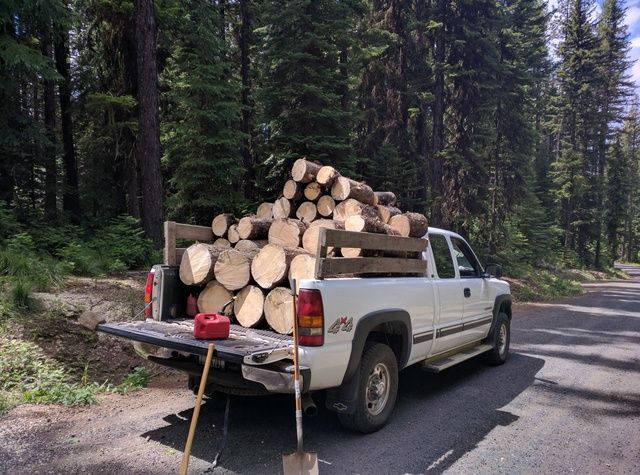AirSupport wrote:
On "paper," the braking limitations set by the manufacturer under "ideal" conditions look pretty good, don't they? However in reality they don't seem to really live up. Especially when the lighter brakes on a 1/2 ton heat up quickly from down hill driving and with an "8,000 lb" load as you claim. When driving down a steep grade, even with brakes working properly, you'd discover the braking difference between a 3/4 ton, vs a 1/2 ton truck and with your "8,000lb" trailer load. At times, the trailer seems to control the tow vehicle, especially when one loads up the trailer too heavy. Personally, my own feeling is an 8,000lb trailer load is way over the capabilities of a 1/2 ton truck, except maybe for flat surfaced streets without hills or steep mountain roads. You're just asking for it if the trailer/truck get ahead of you downhill.
Manufacturers would be fools to design brake packages just to meet minimum standards under the most ideal conditions. I mean that would be a special kind of stupid. In this litigious society that we live in these days, you'd have to be a special kind of moron to design a safety item that only performs well in ideal conditions. The first truck that got loaded up to GVWR and sent down a hill would surely come flying off the other end.
I'm glad you feel 8,000 lbs is too much for a 1/2 ton truck, but the only things that matter to me are GVWR, FAWR, RAWR, and GCWR of my truck. I'm all ok there. The truck has 142,000 miles on it and about a quarter of those miles are towing. My truck handles my trailer just fine. I keep up with my maintenance and my truck is very sound according to Dodge. I've been up and down all kinds of grades all around this country with the truck and have never have a problem coming down. Controlling your speed at the top of the hill and letting the transmission work for you should do the majority of the work. The occasional touch is all that's necessary. You shouldn't be riding the brakes down a hill and if you are then there's something wrong.
As I said before,
the trailer should never push the truck. The truck stops the weight that it's carrying and the trailer's axles stops the weight that it's carrying. If the truck is trying to stop the trailer, then something is not right with the brakes on the trailer.
Also trucks should should not be evaluated by some passé class distinction either. Each truck should be evaluated based on it's own limits that are specified by the manufacturer. Dodge gives the greenlight and I'm comfortable with it.
AirSupport wrote:
"Exceeds." There's another key component buzz word to this equation. Sorry, but in the interest of safety, I wouldn't take your advice on towing,
That's great. No one said you had to take any advice. I'm not sure how the word "exceeds" classifies as a buzzword:?. My trailer weighs anywhere from its original dry weight of 7,660 to 8,520 packed for a 3 week cross country trip. According to most scale tickets I pull we range between 8,100-8200. Sounds like the word "exceeds" is apt.
AirSupport wrote:
Why did it come to that condition in the first place? Mechanical failure with the trailer's electric brakes? "More effort" ...more buzz words here that stand out and supports my original point about heavy duty truck brakes. Again, another reason to have good heavy duty brakes vs the lighter brakes of a 1/2 ton, especially for your "8,000lb" trailer.
I have no doubt a 1/2 ton can tow plenty of trailers, but very light weighted ones at best.
I experience a total failure of all of my brakes on my trailer. I later determined that a couple of shorts and a bad ground caused all the brakes to fail. This was initially discovered while approaching a light in the middle of the highway at 60 mph (Why is there a light in the middle of the 75 mph highway?). Touching the brakes it became clear what was going on. I put my foot down into the pedal and stopped my combo without any assistance of the trailer. The trailer weighed 8240 lbs that day according to the CAT scale. Oh yeah it took much longer to stop the combo, but the combo did stop safely. The brakes didn't fade, smoke, catch on fire, or explode.
I ended up traveling 40 additional miles this way to get home, the place where I know I could properly diagnose the trailer's brakes. Driving accordingly, I successfully made numerous other stops along the way. An inspection of the trucks brakes after the event showed no problems. Not once did I or my wife feel like we'd entered into a panic situation. My wife told me she didn't suspect anything was wrong until I told her about what was going on while we were driving.
I'm not sure how "more effort" is a buzzword. Take foot, put on pedal, press a lot harder than normal, keep it there until stopped. I never thought I would actually have to spell that out for someone.
In the situation could a 3/4 or 1 ton done a better job of stopping the combo, well duh. Heck a Class 8 would've done an even better job. Do I have a need for any of those, nope. This truck does all I command it to do.
